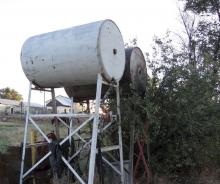Just what the cost will be is not yet known, as refineries will have a year to comply with Ottawa's new Clean Fuel Regulations.
The new regulations will cover everything from fuel production and transport to consumption.
Ray Orb, President of the Saskatchewan Association of Rural Municipalities says once again we will see an increase in the cost of gas and diesel for consumers, municipalities, and farmers.
He's concerned about the impact this could have on the agriculture sector and more specifically the viability of farmers' operations.
"Well, we're not exactly sure what will happen this year on July 1. There will be an increase you know at the pumps and also delivery charges, but we know what the full effect will be by 2030 - we're looking at probably about 17 cents a litre extra on diesel fuel."
He says the Clean Fuel Regulations and the potential impact basically amount to a second carbon tax - Carbon Tax 2.0.
"So it will affect pretty much everyone in this province that buys either gasoline or diesel fuel. You know, that will affect farmers, but it also affects rural municipalities too, because they're fairly large users of fuel, especially diesel fuel. So it's a big concern, I think for the agriculture industry, and for all the other industries that drive our provincial economy."
SARM issued a press release this week urging the federal government to reconsider imposing this next carbon tax.
SARM continues to stress to the Federal Government that it is imperative to strike a balance between environmental stewardship and the economic well-being of Saskatchewan's farmers. Agriculture is an energy-intensive industry, requiring fuel for machinery, transportation, and heating. The imposition of these carbon taxes directly increases the cost of these essential inputs, straining farmers' profitability and jeopardizing the viability of their operations.
Moreover, they fail to consider the unique circumstances of Saskatchewan's farming sector. The province experiences long and harsh winters, necessitating the use of heating systems to protect livestock and maintain optimal growing conditions in greenhouses and barns. This increased energy demand directly translates into higher carbon tax costs, creating an unfair disadvantage for farmers in Saskatchewan compared to those in regions with milder climates.
Saskatchewan relies on its ability to produce food and agricultural products efficiently and cost-effectively. Saskatchewan farmers have long been recognized for their ability to contribute to food security, and the clean fuel standards undermine their crucial role in feeding both local and global populations.
These carbon taxes continue to increase the production costs for farmers, putting them at a disadvantage. This threatens Saskatchewan's agricultural exports and undermines the province's economic growth and prosperity.
